As the yuletide season begins, it is becoming evidently clear that it would not be the usual boisterous celebration season which Nigerians are used to, because of the pervasive insecurity across the country, high cost of goods and services and the resurgence of the COVID-19 pandemic. Reporter Gabriel Atumeyi took a tour of the Federal Capital Territory to take its pulse and reflected his findings in this report.
Relaxation activities and arenas, concerts, carnivals and street parties are among the many activities prohibited by the Federal Government and selected state governments this period. For many, who had looked forward to enjoying the break with family and friends, the news hit like a bombshell.

*PTF members
The Presidential Task Force on COVID-19 led by the Secretary to the Government of the Federation, Boss Mustapha, made the announcement a few days back, with the explanation that it was aimed at curbing the rising second wave of the virus’ infection in Nigeria.
Similarly, the Governor of Nigeria’s ‘centre of enjoyment’, Lagos State, Babajide Sanwo-Olu, on Friday reinforced a midnight to 4am curfew imposed by the Federal Government, adding that “the protocol of ‘No Mask No Entry’ must be enforced at all public places: offices, businesses, markets, shops, and so on.
He declared that “all places of worship (churches, mosques, etc.) must ensure that no gathering exceeds two hours and also that no gathering exceeds 50 percent of the maximum capacity of the venue.
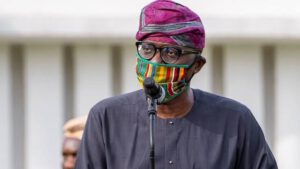
*Sanwo-Olu
“All Event Planners must obtain prior clearance from the Lagos State Safety Commission (www.lasgsafetyreg.com) for all events, and ensure that any planned gatherings do not exceed 300 people.’’
Kaduna and Imo states government followed suit, with Kaduna State Government limiting the service hour of churches and mosques to one hour, while Imo directed that there should be no social gathering during the Christmas period, with more than 100 persons in attendance; just as attendees are required to observe social distancing and all the Covid-19 safety protocols.
But as it has turned out, it is not only COVID-19 restrictions that are threatening to take the shine off the yuletide season. The buzz word on the streets is that ‘there is no money’ to make this year’s festive season a delight. With the Nigerian economy sliding into its worst recession in 30 years, no thanks to COVID-19, and business concerns either packing up or experiencing low patronage, Nigeria’s unemployment level has heightened.
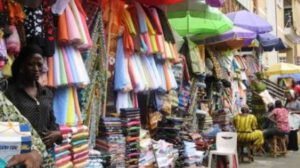
*Fabric market
Add this to the skyrocketing prices of commodities – food items topping the chart – and the impact on the common man’s purchasing power, the picture remains gloomy.
Usually, at this time of the year, traders are mostly in high spirits because they engage in brisk business and make extra profit as buyers and customers troop out en mass to shop ahead of the festivities.
When 365Daily visited some markets ahead of the Christmas celebration, it observed that the usual boisterous mood and heavy human traffic were lacking. A chat with some traders and buyers revealed that the harsh economic situation was to blame for the low-key activities.
“The market is dry, things are too hard, just look around, things are too dry. No money, you can’t compare it to last year,’’ said Chinyere Nonso, a shop owner and trader in second hand clothing in Kubwa Modern Market.
Another trader, Innocent Odey, a dealer in artificial hairs and other female accessories at the Dutse Modern Market in Bwari axis of Abuja, also disclosed to 365Daily that the market has failed to ‘’pick up.”
He said: “You can’t compare this year to other years. The market is very, very dull. Last year, by now we were having massive sales, but what we are witnessing now is the contrary.”
Apart from the rising prices of commodities and goods, insecurity is probably another reason why many Nigerians cannot celebrate the usual way.
From Kuje in Abuja, all the way to Zambamari in Borno State, the country has been under the tight grip of terror. Just few days ago, over 300 school boys abducted in Kankara, Katsina State regained freedom from the hands of their kidnappers. Not many victims of kidnapping have good endings like that of the boys.
Indeed, many Nigerians have been further impoverished because they are often compelled to sell anything of value in order to secure the release of their loved ones from the den of these criminals. Even worse, some of them have had to contend with the murder of abducted relatives after ransom had been paid, or because the ransom could not be paid or just because the abductors just felt like wasting human life.
Though December in Nigeria is usually a time for heightened robbery and kidnapping activities, many Nigerians believe that the situation has escalated,, especially with the Police still reeling from losses suffered during the EndSARS protests.
Increased activities of violent and criminal gangs are remarkably not restricted to any single geo-political region, as kidnapping has become rampant across the country, while banditry continues to ravage the North west. One road which is notorious for these abductions is the Abuja – Kaduna expressway, which has compelled travelers to seek an alternative route by joining the Abuja to Kaduna train services, despite soaring prices and unavailability of tickets.
When 365Daily visited the popular Jabi Motor Park in the heart of Abuja, the atmosphere was quite suppressed as only few travelers could be seen.
Speaking to 365Daily, one Musa Bala who transports passengers in his commercial vehicle said the general situation of the country is discouraging travel, particularly the security situation.
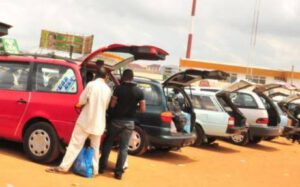
*Jabi Motor Park
‘’It is not just the lack of money that is keeping people from traveling but it is also the fear of the road. But some passengers are still going because the security situation is in God’s hands. But we drivers are not afraid of the roads. The prices are high.
“From here to Kaduna used to be about N1,500 to N2,000 but it is now about N4,500. We loaded to Jos yesterday for N3,000. To Kano, which used to be between N1,500, N1,800 and N2,000 is now up to N5,500. Things are not good,’’ he added.
Abubakar Adamu, a driver at Zuba New Garage, also lamented to 365Daily about the poor patronage by passengers.
Adamu: “Truth is people are not traveling much. Although people are saying maybe a week or few days to Christmas, but for now, we are not seeing change. By this time last year, everywhere here was filled with intending travelers.
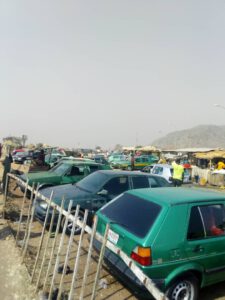
*Zuba New Garage
“This year, there is nothing. I think it is because of the situation of the country. The normal price that we are taking them is what we’re charging, still they are complaining that there is no money.
“We did not increase the fare. For example, from Zuba to Minna, we have been taking one at the front and three at the back in small cars and each passenger pays N1,500. Kaduna too is N1,500. Since the Coronavirus came, that is how we have been taking passengers. We did not add anything despite the increment in fuel prices and they are still complaining.’’
At the Lagos Park, also in Zuba, one Mohammed Iliyasu expressed his disappointment, saying, “Last year, by this time, you would not see any passenger in the park by this time. All buses would have left the park. But this year, no passenger, no money, no travel.
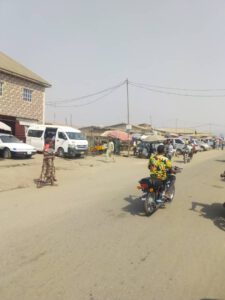
*Lagos Park, Zuba
“Everyone is crying. To see all these big bus companies still loading at this time is surprising and bad for business. Usually, in this period, by now, 12 noon, we would have finished loading and gone home,’’ he added.
It was the same story for Sani Shuaibu who also loads vehicles at Zuba New Garage. For him, the lack of money, coupled with the prevailing security situation, is the reason for the scant travelers.
He said, “It is not just lack of money, it is also the increasing spate of kidnapping. Passengers are afraid of the Kaduna Road and the resurgence of COVID-19 has aggravated the situation. People don’t want to travel. But what we can do, it is to thank God,’’ he said, with a tinge of resignation.